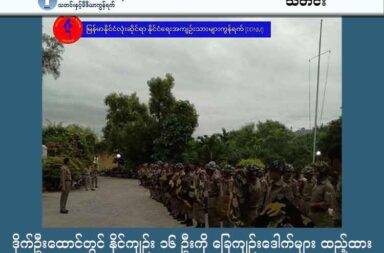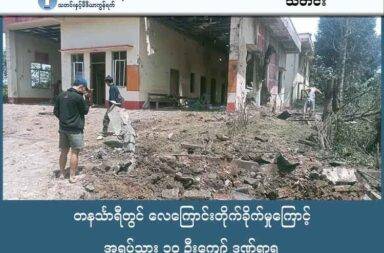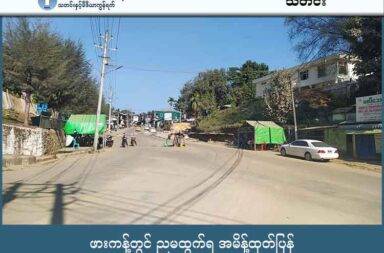Mongkai Locals Protest Coal Mine
More than 3,000 protesters gathered to oppose the latest bid to restart coal-mining operations in the southern Shan State township.
By NETWORK MEDIA GROUP
Thursday, July 11, 2019
More than 3,000 people in southern Shan State’s Mongkai Township have called for an end to a new coal-mining project that they say will harm the local environment and exacerbate land disputes.
The protesters, who mostly hailed from local farming communities, said the mine would also devastate agriculture in the area.
“It impacts on water resources. It causes water to dry up. This will affect our paddy fields, which we depend on for a living. And the mine is just two or three miles away from town, so it could also hurt the health of local people,” said Sai Lon, a protester from Mongkai who spoke to NMG.
In May 2017, nearly 5,000 protesters successfully blocked efforts by two mining companies, Pyae Aung Hein and Hein Metta, to begin extracting coal from the area. The mining operations were halted after an inspection by government officials.
Now, two years later, another company has defied official restrictions in a bid to restart mining in Mongkai.
“The company is called Noble Global. Its chairman is U Aik Chon. They brought in their machines in May and constructed a road in June. Then they started to dig. They have been digging without any permission,” Sai Lon told NMG.
According to Sai Lon, companies interested in exploiting the area’s mineral resources often work with armed groups active in the township, including the Burma Army and the Restoration Council of Shan State/Shan State Army, as well as a local militia group.
“Some companies are working together with armed groups, who threaten us if we oppose the coal-mining projects,” he said.
Meanwhile, environmentalists say that the impact of the project could extend well beyond the mine’s immediate surroundings.
The mine site is located next to the Nam Teng stream, which flows through Mongkai, Mongnai, Namsan, Laikha, Kengtung, and Lamkho townships.
“Local people are very worried about this. They depend on the Nam Teng stream, and they are worried that chemical waste or coal dust will contaminate it,” said Sai Khur Seng, of the Shan Environmental Group.
Mine operators active here in the past showed very little concern for the impact of their activities, and newcomers seem similarly uninterested in minimizing damage to the environment, he said.
“In the past, Chinese and Thai companies came here and worked with local businessmen to extract coal. Now a new company is digging around, looking for coal deposits. They all just take what they want and dump the rest wherever they like,” said Sai Khur Seng.
In many cases, he added, farmland is confiscated by the companies, fueling land disputes.
One problem, he said, is that there are no laws that enable local people to seek redress for damage or losses suffered as a result of mining activities, and no official policy regarding the need for companies to seek consent from local communities before beginning operations.
In any case, he added, it would be better to leave the coal in the ground.
“There are many other ways to generate income, without having to extract coal just because it’s there. Other countries, such as the United States, China and Thailand, often refrain from extracting coal. But our country doesn’t consider the future. This coal-mining project doesn’t benefit Shan State or Burma, it just benefits a handful of people,” said Sai Khur Seng.
“It’s better to listen to the voice of local people,” he added.


